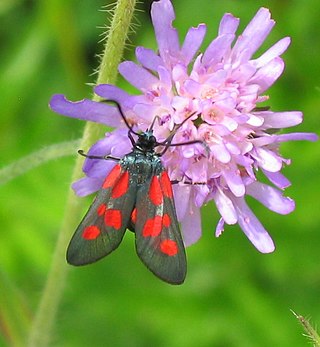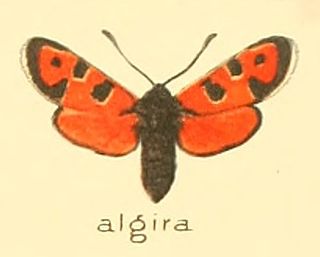
Zygaena is a genus of moths in the family Zygaenidae. These brightly coloured, day-flying moths are native to the West Palearctic.

Zygaena carniolica, sometimes described as the crepuscular burnet or eastern burnet, is a member of the family Zygaenidae.

Zygaena trifolii, the five-spot burnet, is a moth in the family Zygaenidae. It is found from North Africa, through the western Mediterranean, Great Britain and central Europe to Ukraine. It is not found in Scandinavia.

Zygaena viciae, the New Forest burnet moth, is a member of the Zygaenidae family, found in the northern hemisphere. Since 1927 it has been extinct in the New Forest, England, after which it is named. It is also known in Europe as the small five-spotted ram.

Zygaena lonicerae, the narrow-bordered five-spot burnet, is a moth of the family Zygaenidae. The species was first described by Theodor Gottlieb von Scheven in 1777.

Zygaena purpuralis, the transparent burnet, is a moth of the family Zygaenidae.

Zygaena osterodensis is a moth of the family Zygaenidae.

Zygaena romeo is a moth of the Zygaenidae family.

Zygaena sarpedon is a moth of the Zygaenidae family. It is found in France, Italy and on the Iberian Peninsula.

Zygaena orana is a species of moth in the family Zygaenidae. It is found on Sardinia and in North Africa, including Morocco, Algeria and Tunisia.

Zygaena brizae is a species of moth in the Zygaenidae family. It is found in France, Italy, Austria, the Czech Republic, Poland, Slovakia, Hungary, the Balkan Peninsula, Moldova, Ukraine, Russia and Georgia.

Zygaena contaminei is a species of moth in the Zygaenidae family. It is found in France and Spain.

Zygaena cynarae is a species of moth in the Zygaenidae family. It is found from France east to Russia.

Zygaena punctum is a species of moth in the family Zygaenidae. It is found in Poland, the Czech Republic, Slovakia, Austria, Slovenia, Italy, the Balkan Peninsula, Moldova, Ukraine, Russia and Turkey.

Zygaena angelicae is a species of moth in the Zygaenidae family. It is found in Central Europe, from Greece to southern Germany and Thuringia. Z.angelicae has blue-black or green-black forewings, whose inner angles are strongly rounded off. On the forewings there are five or six red spots, two of which are always close together. In the five-spotted individuals, the spots on the underside of the wings are connected by a red stripe, in the six-spotted ones this is a large patch. The black margin of the red hind wings is wide. The antennal club is white at the tip less so than in Zygaena transalpina and the white may be completely absent. The wingspan is 30–33 mm.

Zygaena dorycnii is a species of moth in the family Zygaenidae. It is found in Ukraine, Russia, Turkey and Armenia.

Zygaena lavandulae is a species of moth in the family Zygaenidae.

Zygaena rhadamanthus is a species of moth in the Zygaenidae family. It is found in France, Spain, Portugal and Italy.

Zygaena algira is a species of moth in the Zygaenidae family. It is found in Morocco, Algeria and Tunisia.

Zygaena marcuna is a species of moth in the Zygaenidae family. It is found in Morocco, Algeria and Tunisia. It is dull red or dark pink. The black dot situated in the distal area touches the black costal margin, and the red basal area is separated from the red discal area by a heavy black band. It was described from the Aures Mountains from specimens found in May.The larval host plants are Ononis natrix and Ononis repens. Imagines fly in May and June.




















